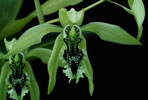|
|
|
|
|
| |
Flasks of
Coelogyne pandurata 'Patricia' × '#1' |
|
| |
|
|
| |
| Number: |
TN5156 |
| Name: |
Coelogyne pandurata 'Patricia' × '#1'
|
| Type: |
outcross (What's that?) |
|
Seed Donor: |
Dale Borders
|
|
Click to Enlarge

Pod Parent Flower |
Click to Enlarge

Pollen Parent Flower |
Click to Enlarge

Pollen Parent Labellum |
Click to Enlarge

Pollen Parent Capsule at 118 days |
Click to Enlarge

Pollen Parent Emptied Capsule at 227 days |
|
|
|
| |
Culture Notes from Donor: Parent plants: Temperature range I (60-83°F)
Comments: Pollen parent plant: Wonderfully sweet musk scented during the heat of the day.
For additional origin/habitat information supplied courtesy of
Charles and Margaret Baker, see further below, near the bottom of this page.
|
Temperatures we attempt to use in the lab & greenhouse:
| For Species: |
|
Spring, Summer, Autumn, Winter: days average 89°F, nights 74°F; best fit is warm 90-70°F
(Source:
Baker's Web OSC) |
|
About the name...
| Etymology of |
Coelogyne |
|
From latinized Greek "koilos" hollow, cavity; "gyne" woman, womb, stigma. The column is frontally hollow.
(Source:
Mayr & Schmucker 1998) |
| Etymology of |
pandurata |
|
From Latin "panduratus" lute-shaped.
(Source:
Mayr & Schmucker 1998) |
| Pronunciation of |
Coelogyne |
|
see-LAW-ji-nee
(Source:
Hawkes 1978) |
| Pronunciation of |
pandurata |
|
pand-yoo-RAH-ta
(Source:
Hawkes 1978) |
|
If you would like to direct someone to this web page, please copy and paste this URL into your email:
http://troymeyers.com/d?015156
| Flask Information |
| Availability: |
We have sold all of the flasks for this item. |
| You should: |
Consider getting individual plants or compots instead of a flask.
You can place a "Notify Flask Recipients" Request, and either we or a flask recipient may contact you when plants are available.
You may also place a "Notify Retries" Request, and if an identical pollination (the same parents) is done again, we'll let you know.
You may reserve a flask, but it's very unlikely you'll get one ...this could only happen if we found a flask that we didn't know we had. |
| Yield Estimate: |
30 plants (based on flask surveys done 10/13/2006 )
|
| Plantlet Sizes: |
From many flasks 25 - 55 mm plants (based on flask surveys done 03/02/2007 )
From one most recently surveyed flask 25 - 55 mm (03/02/2007)
|
|
You might also want to:
|
View the seed assay for this item.
View items of the same species.
View items of the same genus.
|
| Ordering Information |
| You are not currently logged in. |
|
You must be a registered user and be logged in to reserve a flask or place a notification request. Please log in:
|
|
|
|
|
|
| |
The origin/habitat information below is supplied courtesy of Charles and Margaret Baker
The following information is based on the name of the plant provided by the donor, and assumes that the name is correct. If the plant has been misidentified, then the following information may not be correct.
This text is copyrighted by the Bakers and may not be reproduced without permission.
ORIGIN/HABITAT: Plants are reported in Malaya, Sumatra, Borneo, and the
Philippines on Mindanao, Luzon and Samar Islands. They generally grow on
old trees by rivers, near the coast, or in hot, damp, swampy lowlands.
More about this information and the Bakers...
|
|
|
| |
|
|
|